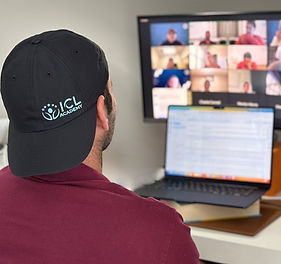

ICL LEARNING MODEL
A TRUE COLLEGE PREP MODEL
ICL students participate in college-style weekly scheduling. Instead of traditional daily blocked scheduling, live seminars take place once per week. We believe that preparing students for a college like schedule prepares them to thrive in a university environment while still in secondary school.
Learning with ICL Academy is inspiring, flexible, and engaging while meeting college and career readiness standards. Our curriculum empowers students to think critically and apply their knowledge in authentic ways through Impact Learning.
LIVE SEMINAR WEEKLY SCHEDULE
Inspired by a college learning approach, our learning model combines asynchronous work time and synchronous seminars. The information below outlines how we implement the college-learning model within our curriculum.
Instruction
Each lesson begins with 30 minutes of asynchronous instruction. Students will view written information, graphics, and images with audio clips that further support the content. Supplemental resources, such as videos and study sites are also provided to help students deepen their understanding.
Application
Once students have an understanding of the content and topics, they will produce an open-ended assignment that utilizes skills from the week. Application assignments vary across levels and courses but many require students to analyze materials and think critically about concepts. Students will pull evidence from course resources as well as make connections to their own experiences. At times, application assignments could build over the weeks and lead to an end-of-unit product. Students also have opportunities for choice and collaboration as well as connecting their passions to application tasks.
Assessment
At the end of each unit, students will take an assessment to demonstrate their understanding. This could be a standardized assessment or a final product.
Practice
After viewing the instructional information, students will complete a practice assessment to check for their understanding. Practice assessments are typically 10 questions with a mixture of multiple-choice, matching, ordering, and fill-in-the-blank questions. These assessments are automatically graded so students can receive immediate feedback to gauge their understanding of the lesson.
Live Seminars and Discussion
In the first 30 minutes of the seminar, teachers will address and support the weekly topics. This is an opportunity to ask questions, clarify any misunderstandings and discuss examples to enhance the students' understanding of the asynchronous materials.
During the final 15 minutes of the seminar, students will have a class discussion which allows them to collaborate with peers. Discussion prompts will allow students to share opinions and make connections to the content.
If students can not attend a seminar, they can view the seminar recording at their convenience. Students will submit a quick seminar reflection that states what they learned as well as post their discussion response asynchronously. This way, students still feel a part of the learning community while still having flexibility with coursework.

HONORS PROJECTS
High school students have the opportunity to take courses at the honors level. Honors students will complete an end-of-unit project that demonstrates a deeper understanding of the course materials. Projects vary across subjects, but many projects require students to analyze materials and form a connection to topics throughout the unit. In addition, honors students will also complete a semester-long capstone project.

AP COURSES
'The Advanced Placement® Program (AP) enables willing and academically prepared students to pursue college-level studies while still in high school. The AP Program develops college-level courses that high schools can choose to offer and corresponding AP Exams that are administered once a year.
ICL currently offers AP Language and Composition, AP Biology, AP US History, AP Art History, AP Computer Science, AP Statistics, AP English Literature, AP Government, AP World History, AP Microeconomics, AP MacroEconomics, AP Environmental Science, AP Calculus AB, AP Spanish



